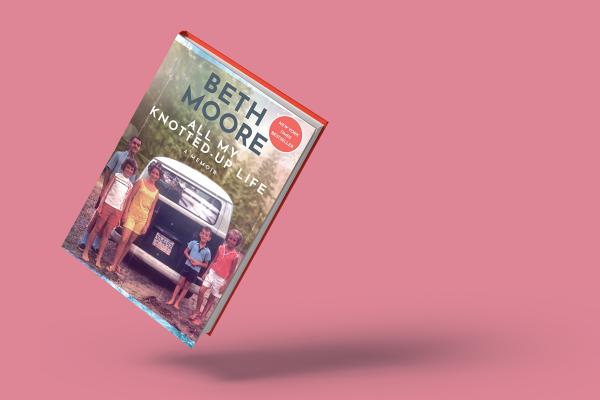“GRIEF TAKES SO much energy. I can feel it even in my fingers.”
These are the words that drew me to Christian author and speaker Beth Moore’s memoir, All My Knotted-Up Life. She posted the sentences as two separate tweets in the wake of her brother’s unexpected death, less than three weeks before her memoir’s release.
Through her Living Proof Ministries, Moore is one of the most prominent white evangelical women in the U.S. I braced myself as I entered the book, but she delivers stories of resilience with all the charm, sweetness, and humor one would expect from a memoirist with roots in Arkadelphia, Arkansas.
All My Knotted-Up Life begins with Moore’s childhood, an at-first-glance idyllic time when she and her four siblings spent hours outside before sitting down to dinner with their parents and maternal grandmother (“Nanny”). But her upbringing also contained trauma: Beth’s father sexually abused her, for instance, and her mother had severe mental health struggles, caused in part by her husband’s emotional manipulation.
When Nanny died suddenly, Moore and her siblings “had to stand ankle-deep in the stream of her legacy,” holding in tension that there were “words and ways [of Nanny’s] we each wanted to keep, but some needed condemning to the pit of hell. Racism ran through my grandmother’s red blood like orange iron.” It takes a great deal of humility — and a greater deal of love — to dismantle the pedestals on which we put our elders while still clinging tight to the cherished memories we share with them.
Moore’s memoir holds a tender balance between candor and restraint. At times, she sensitively gives readers enough context to see her trauma, while avoiding descriptions of the specific actions that caused it. In some moments, however, this left me wanting more. My scant prior knowledge of Moore included that, in 2021, she left the Southern Baptist Convention, the denomination she’d “loved” and “served” throughout her life. Yet her description of her departure did not include the “Three Steps to Finding a New Faith Tradition After Your Old One Totally Wrecks You” guide I’d (apparently) expected.
As someone grappling with a floundering faith, I’d hoped for Moore’s words to serve as both balm and touchstone; I wanted to know how she continues to cling to the loving God she preaches about. Her memoir continually points back to the Lord’s faithfulness — the way “he who walked on water plunged his hand beneath the churning brine and brought me forth from the belly of the sea.” In a different season of my life, her answer would have been enough: She took her suffering to the Lord, and the Lord made sense of it.
But today, I’m walking away from All My Knotted-Up Life wondering if I’ll ever untangle the knots of my own. I’m sure Moore would be the first to tell me that, although there’s no quick path to disentanglement, one day I will be “broken free.” In the meantime, I’m content to take a page from Moore’s book — I’ll “plead to the Lord the words of the psalmist David: ‘Make me to hear joy and gladness; that the bones which thou hast broken may rejoice’ (Psalm 51:8, KJV).”

Got something to say about what you're reading? We value your feedback!






